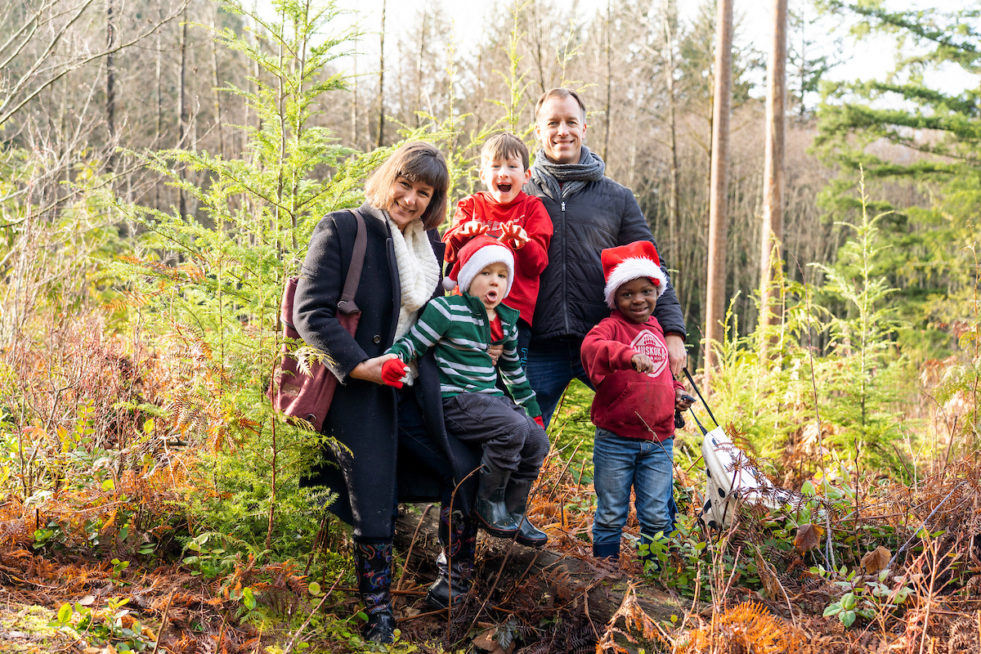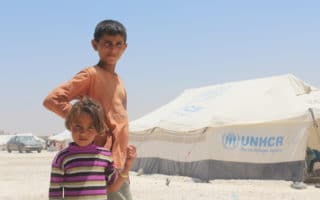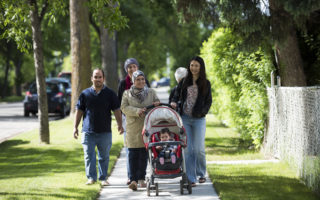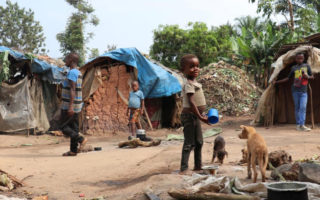
The Reid family take Delphin, 5, a refugee from the Democratic Republic of Congo, to cut down a Christmas tree in Squamish, B.C. © UNHCR/Jimmy Jeong
It took five families to sponsor a refugee family, and one to give them the Christmas they’ll always remember.
Delphin Ngage never thought he’d one day find himself searching for a Christmas tree in the forest of Squamish, B.C. Born in the Democratic Republic of Congo (DRC), the five-year-old spent the first years of his young life in a refugee camp in Namibia. Now Delphin has resettled in Canada with his mother and newborn brother, preparing for their first holiday season with their sponsored family.
“Every new experience that we have with them brings us closer, and we feel more like family together. It was nice to share that tradition with them,” said Karina Reid, who along with five other families in B.C., helped sponsor Delphin and his mother Atosha.
Reid took Delphin along with her family to cut down a Christmas tree in Squamish, about an hour’s drive from their home in Richmond, B.C. It’s an annual holiday tradition for them, which they were happy to share with the Ngage family this year.
It was a morning to remember for Reid, who painted a beautiful, vivid description of Delphin and her two sons, ages five and seven, travelling through the valley, surrounded by mountains on a sunny-winter Saturday morning.
They threw rocks in the water, helped cut down the thin, modest tree and carried it back home to add decorations. As the kids were running and playing around the house, Reid sat with Atosha and shared the meaning behind every ornament on the tree, and the memories attached to it.
“My Christmas present for them is to buy them a personalized Christmas decoration that would signify their first Christmas here in Canada,” said Reid.
After being inspired by her friend Nicole Javadi who sponsored a Syrian family years ago, Reid rallied her friends to help sponsor a refugee family through the Blended Visa Office-Referred (BVOR) program. This service is unique to Canada, and helps make private sponsorship easier by providing six months of financial support after a refugee arrives.
“What people need to realize is that it’s doable, and the impact that you can have on someone’s life when you sponsor a family—there’s nothing that compares,” said Javadi, who also helped sponsor the Ngage family.
“It’s easy to just be apathetic to the world’s situation, and go on buying Christmas presents, but I feel like it’s not right. We all have to take responsibility for the world, not just for our own families,” she said.
They both received help from the Refugee Sponsorship Training Program, who matched them with Atosha and her family. The Ngage’s are among the estimated 4.5 million people displaced by violence and conflict in the DRC. Some of Atosha’s relatives are still displaced in Namibia, and she hopes to one day sponsor them to Canada.
“I find Canada is very, very good, I like Canada, it’s changed my life!” said Atosha, who found a job within the first few months of settling in Canada, before giving birth to her newborn son, Enoch. She has hopes to one day go to school and get her own apartment.
“My children will go to school and go to university to get a good job. I want a good life for my children,” she said.
The five families helped Atosha get a cell-phone when she first arrived, so she could stay in touch with her family overseas. Even though she’s happy to stay in touch, she stays constantly aware of the danger her family and friends face back home.
“As much as this is beautiful, and we’re having this experience, Atosha is still pulled into two different worlds,” said Reid.
“I do think that must be so heart-wrenching for her, since she has a different experience living in Canada, and her heart is so torn,” she said.
The experience of sponsoring a refugee family has had an amazing impact on all of the families involved. Two of the kids in their group did a presentation in their Grade 2 class on how everyone can help refugees.
“You can teach your children to be kind and empathetic, but to actually give them the opportunity to see how kindness and empathy actually change people’s lives, by giving them the ability to connect with someone new, and welcome them to our family—those things are not installed in a child the same way as experiencing it,” said Javadi.





